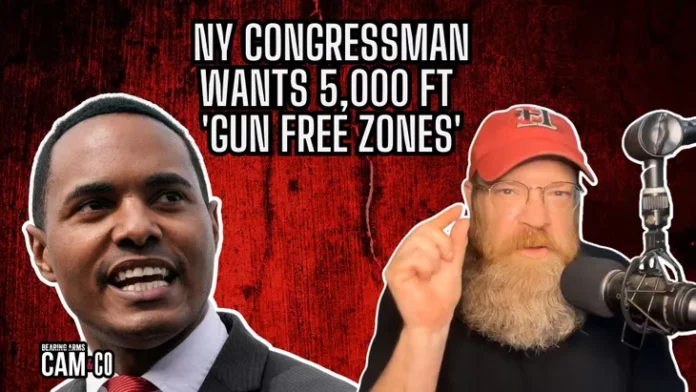The Gun Free School Zones Act is one of those pieces of federal law that might have had good intentions behind it, but is still broadly aimed in the wrong direction. The law makes it a federal crime to knowingly possess a firearm within 1,000 feet of any public, private, or parochial school, with only limited exceptions for residents and private property owners as well as individuals who possess a valid concealed carry license issued by the state where the school zone is located; an increasingly problematic provision given that in more than half the country no license is needed in order for legal gun owners to lawfully carry.
The law also fails to respect firearms reciprocity agreements, meaning that an active carry license issued in your state of residence will be of no use or help if you’re caught with a gun in a school zone in a neighboring state. It’s perfectly legal for me to drive by my local high school with my gun on me, but if I did the same thing in North Carolina or West Virginia I could be looking at five years in federal prison, despite the fact that both states recognize Virginia carry licenses.
The law is definitely in need of some serious revision if not outright repeal, but Rep. Richie Torres (D-NY) wants to make some changes that would make the current statute even worse from a constitutional perspective. This week Torres introduced the Angellyh Yambo Gun Free Zone Expansion Act of 2023, a bill named after a 16-year-old girl who was shot and killed outside a New York City school last year, allegedly by a 17-year-old who had illegally armed himself with a home-built firearm. The legislation not only takes aim at unserialized firearms and incomplete gun parts, but would expand the Gun Free School Zones Act’s prohibition on gun possession from 1,000 feet to 5,000 feet; nearly a mile in every direction from every public, private, charter school and early childhood education center.
In his press release, Torres touted the praise from several of Yambo’s relatives, as well as the District Attorney in the Bronx, who claim that the new legislation will somehow actually prevent bad actors from carrying near a school.
“Gun violence is a national crisis that demands a national solution. The ‘Angellyh Yambo Gun Free Zone Expansion Act of 2023’ will help kids in our community feel a little safer walking from and to school,” said Mary Hernandez, Angellyh Yambo’s aunt and CEO/Founder of the Angellyh Yambo Foundation.
“We are extremely proud of the ‘Angellyh Yambo Gun Free Zone Expansion Act of 2023’, which will make the Bronx and the rest of the nation safer. This bill will help prevent gun violence in our communities by prohibiting people from carrying firearms with 5,000 ft. from school grounds” said Alexandra Maruri with the Angellyh Yambo Foundation.
“Thank you to Congressmember Ritchie Torres for proposed changes to federal law to expand gun-free zones around schools to 5,000 feet and include early childhood education programs in the protected area, as well as prohibiting possession of ghost guns,” said Bronx District Attorney Darcel D. Clark. “A teen with a ghost gun allegedly killed 16-year-old Angellyah Yambo and wounded two other teens as they walked from their high school in April 2022. Naming the proposed legislation for Angellyah is poignantly appropriate, as her family has channeled their grief into advocacy against gun violence.”
Note what Clark said; a teen with a “ghost gun” allegedly killed Yambo near her high school. None of the existing laws in New York City, New York State, or at the federal level prevented the 17-year-old suspect from illegally acquiring a gun, nor did the Gun Free School Zones Act actually stop him from allegedly pulling the gun and firing at several individuals during a dispute about a block away from the University Prep Charter High School in the Bronx last spring. If gun control laws alone were enough to prevent senseless murders like Yambo’s death, the straight-A student and beloved daughter and friend would still be alive today.
Instead of focusing on the person who pulled the trigger, Torres is fixated on the gun that he illegally possessed and the false promise that “gun-free” zones are actually free of firearms. Would any violent criminal be deterred from carrying out their crimes if those gun-free zones were expanded to nearly a mile in every direction from all educational facilities across the country? I highly doubt it. Instead, it would be legal gun owners who would be most at risk, especially in those 27 states where permitless carry is already or soon will be in effect. Lawfully carrying would be a virtual impossibility in large swathes of most cities and suburbs; a bonus for Torres and his anti-gun allies, but a clear infringement on the rights of responsible gun owners.
I feel for the Yambo family, but that doesn’t mean that Torres has a good idea here. What Congress should really be doing is taking a closer look at the juvenile justice systems across the country, which are routinely turning a blind eye to the actions of young offenders, even when there’s a gun involved. WJLA-TV in Washington, D.C. recently highlighted one teen named Mari who’s been repeatedly arrested on gun charges in Maryland over the past couple of years, only to be given one slap on the wrist after the other.
On Thursday, May 11th, a group of friends was hanging out in the parking lot of North Forestville Elementary School when two people pulled guns and announced it was a carjacking. Police claimed one of them was 18-year-old Lavelle Harris, who police say shot and killed 18-year-old Kendall Batson and took his BMW.
According to charging documents, the other teen who pulled a gun was a 17-year-old known as Mari, who held an assault rifle and said, ‘”I ain’t going to lie to youI’m going to kill you.” Mari then reportedly took another person’s keys and drove off in a Honda.
Now, multiple sources said that Mari has been caught repeatedly with guns and faced little to no consequence. His string of gun arrests began on January 10 along Addison Road when he was caught with a gun after a foot pursuit. He was treated as a juvenile for that incident. On July 13, 2022, he was caught with a gun during a traffic stop. On October 20, 2022, a Maryland State trooper spotted him driving on a flat tire on Rt 4. The trooper found a ghost gun on Mari. On May 11 of this year, he was once again declared a juvenile in one of those cases and released without consequence. Two hours later it’s alleged that he had an assault rifle and was participating in a deadly carjacking.
Two hours after Mari was cut loose by the courts on one gun charge he was allegedly in possession of an “assault weapon” (also already banned under Maryland law) on the grounds of an elementary school. It’s hard to blame this on a lack of gun control in Maryland, which not only bans firearms defined as “assault weapons” but requires licensing and permitting simply to possess a firearm, even in the home. We should be looking at the courts and the lack of consequences the criminal justice system is providing to youthful offenders. The goal of the juvenile justice system may be rehabilitation and not incarceration, but it sure looks like Maryland’s juvenile justice system is failing in that regard, and it’s far from the only state experiencing a rise in juvenile crime. Until we address the actual problem we can’t expect to see much improvement, but Torres would take us further away from real solutions with his bid to turn most cities and suburbs into “gun-free zones” while leaving the perpetrators of violence untouched.




